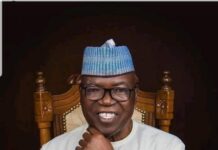 The question on almost every thinking person today is what is the state of the Nigerian State? Are we drifting into the abyss? Are we being governed and what is the state of governance in the country today? The state as we know it from political science does three things. First, it extracts resources from citizens through various forms of taxation. This assumes that the state knows all those who reside in its territory and is able to track them and make them fulfil their fiduciary obligations. Secondly, the state uses the resources it has extracted from residents and citizens to provide public goods such as security, social services and infrastructure for the welfare of inhabitants. Thirdly, the state has a regulatory role of making laws for the good governance of the country and sanctioning those who breach the laws and regulations in place through the judiciary and law enforcement agencies.
The question on almost every thinking person today is what is the state of the Nigerian State? Are we drifting into the abyss? Are we being governed and what is the state of governance in the country today? The state as we know it from political science does three things. First, it extracts resources from citizens through various forms of taxation. This assumes that the state knows all those who reside in its territory and is able to track them and make them fulfil their fiduciary obligations. Secondly, the state uses the resources it has extracted from residents and citizens to provide public goods such as security, social services and infrastructure for the welfare of inhabitants. Thirdly, the state has a regulatory role of making laws for the good governance of the country and sanctioning those who breach the laws and regulations in place through the judiciary and law enforcement agencies.
Last year, the Nigerian state abdicated its responsibility of providing security for oil pipelines and installations and gave contracts to former Niger Delta militants to perform this core task. A couple of weeks ago, the policy was extended to the South West with the contract to one of the leaders of the OPC to perform the same function. The insurgency in many parts of northern Nigeria has persisted and the recent massacre of hundreds of people and destruction of thousands of houses in Baga is just another indicator that the country’s security forces have become the providers of insecurity engaged in crimes against the Nigerian people.
In his definition of the state, Max Weber teaches us that the state must have the monopoly of the legitimate use of violence in modern society. We find ourselves in a situation in Nigeria in which private citizens have access to vast arsenals and use it against citizens and against security forces while for their part, security forces use their own arms in an illegitimate manner killing and maiming citizens in an extra-judicial manner. We know that there is no state in the world where you do not have illegal arms in the hands of private citizens but when the quantum of such arms goes beyond a certain level and such private armies are able to attack security forces at will and the response of the security forces is to turn on ordinary citizens, then the State is in question.
Our Constitution defines the purpose of the state as the protection of the security of Nigerians and the pursuit of their welfare. Nigerians however know that they have to pay for their own security guards and even the bulk of the Nigerian police personnel is used to provide security, not for the people, but for individuals who can afford to pay for the services. Nigerian citizens are forced to provide their own electricity with millions of generators they purchase to power their houses and pollute the atmosphere. Hundreds are killed regularly through carbon monoxide poisoning as they bring these killer machines into the privacy of their rooms. Nigerians go to the stream to fetch water or buy it from water vendors. The water is not potable and poisons families through water borne diseases. The elite is able to pay for personal boreholes in their houses and the result is that they wipe out underground water sources for future generations while surface water is not captured and treated and allowed to flow into the sea. Of course health and education have largely been private and the state is completely disdainful of Chapter Two of our Constitution that directs it to provide for the welfare of citizens.
One of our historic areas of pride as a nation is the freedom of the press. Under all regimes, Nigerians have remained jealous of their freedom of expression and always spoken truth to power. Today, the state is determined to make us shut up. We have all seen how Ishaya Bako’s documentary – Fuelling Poverty was recently banned because is reminded us, as if we will forget, that the Nigerian masses rose up to protest against the abolition of fuel subsidy and against the monumental corruption in the fuel subsidy regime. Of course the ban of the film only increased interest in it as hits on the YouTube site of the film went viral after the ban. The irony is that there is nothing in the film that every Nigerian does not know after all, the January protest were the most popular and mass based uprising in the country’s history. The recent repeated arrests of journalists from the Leadership newspaper and contract that has just been awarded to an Israeli firm to come and monitor our emails and social media and report us to the State are all indications of the determination of those in power to deny us the freedom of expression embedded in our Constitution. Of course all these moves are futile as Nigerians cannot be made to shut up by any government but the fact that Government appears determined to deprive citizens of constitutional rights is another indication of the rapidly declining competence of the State.
Section 15(5) of the 1999 Constitution of the Federal Republic of Nigeria stipulates that “the State shall abolish all corrupt practices and abuse of power.” What does this mean in a context in which those in control of state power have been using the instruments of the state to engage in mega looting of our national resources? They even have the audacity to pardon a former Governor who had been convicted for corruption. The message from the pardon sends the message that doing a good turn to a powerful man is solid ground for wiping out crimes against the Nigerian state and people. It is a deliberate act that sets out to remind Nigerians that the stated anti-corruption stance of the Administration should not be taken seriously. It is a statement made to erode confidence in the rule of law by showing some criminals with connections are more equal than other criminals.
Over the past year, it has been revealed that over two trillion has been spent on fuel subsidy but most of the money was simply stolen by government cronies. And yet, no sanctions have been taken against those responsible. It is true that the wheels of justice turn slowly in our country. However, the real question is why have no sanctions been taken against political appointees and public sector officials that superintended this mega looting of our national resources. The result is that mega corruption appears to have official sanction so the rape of our resources through fuel subsidy scams continues.
The State is supposed to be the guarantor of the rule of law and the equality of all citizens. Yet, we know that in Nigerian prisons today, there are thousands of people who are in jail because they have stolen a chicken or a goat. They are jail because they have committed a crime against the state. Although their theft was petty and most likely due to extreme poverty, they must suffer the punishment because they have committed a crime against the State. The paradox however is that those who steal in billions are always protected by the same state. No wonder Nigerians believe we do not have the same justice for everybody.
The state of the Nigerian State is serious. The State is crumbling before our eyes and it is clear to me that a rescue mission is necessary. That rescue must take the form of a new approach based on good governance in which there is effective, transparent and accountable use of public resources to provide public goods for citizens. If those who exercise State power cannot use it to improve the lives and livelihoods of citizens, then they would have to be replaced.



